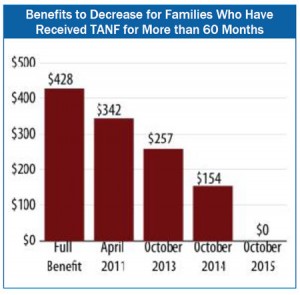The DC Council budget vote on May 28th included a serious discussion about TANF — DC’s welfare-to-work program — with many members expressing concern about a deep cut in income assistance benefits scheduled for this October. An amendment to delay the cut failed by one vote, mainly because TANF job training funds would have been cut to pay for it.
The DC Council may soon have another chance to avoid deep cuts in assistance to poor families with children. The fiscal year 2015 budget approved by the Council left open the possibility of spending up to $50 million, if an upcoming revenue forecast shows that tax collections have improved. If so, the Council could allocate $7 million to maintain Temporary Assistance for Needy Families benefits and to help identify families with special barriers that lead to their long-term welfare receipt.
During the first budget vote, the Council discussed undoing the benefit cut scheduled for October 2014 for families who have received TANF for more than 60 months. These families have already experienced two rounds of benefit cuts and receive just $257 per month for a family of three (See Figure.) In October, these benefits will fall to $154 per month, clearly too little to meet a family’s needs.
The amendment to undo the benefit cut would have taken funding from TANF employment services, leaving most of the 4,500 parents currently waiting for services without help. Yet their TANF time clock would continue to run, making it hard to prepare for employment before reaching their 60-month time limit.
If it turns out that the District’s healthy economy is resulting in growing tax collections, a portion could go to help TANF families with children. The Council could allocate $5.8 million to stop the benefit cut and another $1 million to provide targeted services to long-term recipients. Other jurisdictions have found that parents who remain on TANF for long periods often suffer from significant mental health challenges and/or developmental disabilities. These jurisdictions have used special services to help parents both improve their mental health and functioning, as well as secure employment.
Deep cuts in monthly assistance to poor families who already face enormous challenges are likely to lead to even worse family outcomes, including leaving more at risk of homelessness. By supporting families that need the most help, the Council can instead put them on a path to greater independence.
To print a copy of today’s blog, click here.

